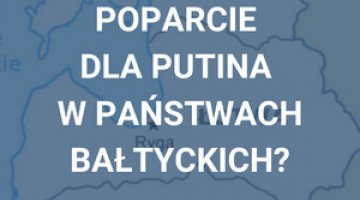Lithuania: record support for Gitanas Nausėda
Gitanas Nausėda won the second round of Lithuania’s presidential election with 74.43% of the vote. This is the highest support a candidate for the office has won since the country restored its independence in 1990. 49.15% of eligible voters participated.
Nausėda, who has served as head of state for five years, ran in the election as an independent candidate, but had the support of the opposition Social Democratic Party. His rival, the Conservative candidate PM Ingrida Šimonytė, was supported by 24.06% of voters. Nausėda defeated Šimonytė by a significant margin in all 60 regions (city and district governments). His best result (more than 90 per cent) came in the Šalčininkai district, which is about 80 per cent inhabited by ethnic Poles.
According to the Lithuanian constitution, once a new president is sworn in, the ruling government (coalition of the Conservatives and two Liberal parties) is obliged to return its powers to the head of state (this is known as a courtesy resignation). The president then entrusts the current council of ministers with the continuation of their duties until a new cabinet is formed. PM Šimonytė has declared her intention to remain in office until the parliamentary elections scheduled for 13 October 2024.
Commentary
- Nausėda’s victory is due to the deep trust Lithuanians have in the incumbent head of state, and above all to the image the president succeeded in building up during his first term. Nausėda is perceived as a pro-family politician who is conservative on social issues, favours the welfare role of the state, and fulfilled his constitutional mission to represent Lithuania internationally in a good way. His record support was also rooted in the fact that people demonstrating their opposition to the government of Prime Minister Šimonytė joined his own supporters (he received 44.10% of the vote in the first round). The elections proved that the Conservatives have retained a stable electorate of around 20% of the voters, which they are unable to increase.
- Nausėda’s views have brought him closer to the Lithuanian left, especially the Social Democratic Party; this is the most popular party in the country, and they supported him in the elections. Despite his declared independence, the president has openly promoted not only the party itself (in the hope that it will win the upcoming parliamentary elections) but also its leader Vilija Blinkevičiūtė, currently an MEP. Nausėda considers her to be the best candidate for the next prime minister of Lithuania, as do more than half of Lithuanians surveyed. The president’s aim is to secure a majority in the next parliament with whom he will find it easier to work than with the Conservatives. He has been in constant conflict with this party, a state of affairs which the public perceives as damaging to the state. For example, the recent disputes with the government have led to a months-long blockade of ambassadorial appointments.
- Nausėda will remain critical of the government, and he may use the opportunity of the ‘courtesy resignation’ to insist on changes to some of its members, accentuating the incompetence and flaws of the current cabinet while doing so. Until the parliamentary elections, further tensions between the government and the president should be expected. Although Nausėda does not have the formal competence to significantly influence domestic politics, in his second term he will continue to support policy initiatives that build up the welfare state. He has also announced a focus on provincial problems. As head of state, he has the constitutional right to conduct foreign policy in tandem with the government, and he will continue to use this right to strengthen Lithuania’s cooperation with the EU and NATO. The US and Germany will remain the country’s most important political partners for the president, as will Poland, Estonia and Latvia within the region. Nausėda will also maintain Lithuania’s support for Ukraine and seek to strengthen his country’s defence.





